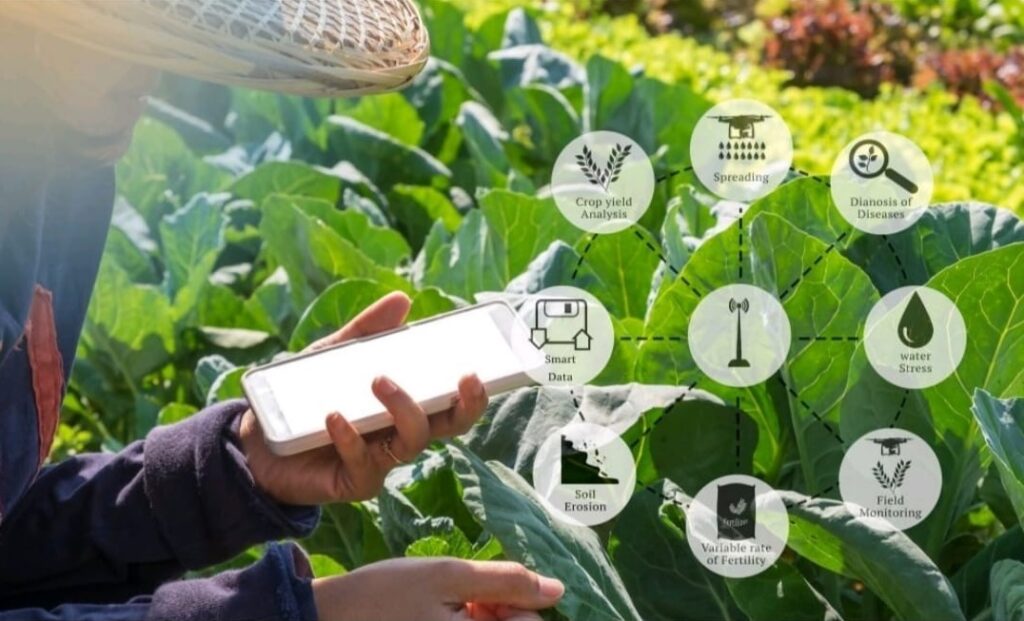Driven by growing awareness of health, environmental sustainability and ethical considerations; the global food landscape has undergone a significant transformation in the last decade or so.
At the heart of this shift is the rise of plant-based nutrition, a trend that has been significantly bolstered by technological advancements. From precision agriculture to innovative food processing, technology is playing a pivotal role in making plant-based diets more accessible, nutritious and appealing to a broader audience.
Precision Agriculture and Genetic Engineering
The journey of plant-based nutrition starts in the fields, where precision agriculture has revolutionized how crops are grown. This technology incorporates data analytics, AI, and IoT (Internet of Things) devices to optimize farming practices.
Farmers can now monitor soil health, water usage, and crop growth with unprecedented accuracy, leading to higher yields and more nutrient-dense plant products.
Genetic engineering complements this by enabling the development of crops with enhanced nutritional profiles. Scientists are creating varieties of grains, vegetables, and legumes that not only resist pests and harsh climates but also contain higher levels of vitamins, minerals, and proteins. For example, biofortified crops like golden rice, which is enriched with vitamin A, are making plant-based diets more nutritionally complete.
Food Processing Innovations
Once harvested, the transformation of plants into palatable, nutritious food is where technology shines. Advances in food science have led to the creation of plant-based meats, dairy alternatives, and other products that mimic traditional animal-based foods in taste, texture, and even appearance.
Companies like Impossible Foods and Beyond Meat leverage technology to create burgers that ‘bleed’ like beef, using plant heme and other compounds to replicate meat’s flavor and mouthfeel.
Moreover, high-pressure processing (HPP) and cold-pressing techniques preserve the nutritional content of foods, extending shelf-life without the need for preservatives. These technologies ensure that consumers enjoy plant-based products that are both fresh and packed with nutrients.
Nutritional Apps and AI
Consumer engagement with plant-based nutrition has been enhanced through mobile applications and AI. Apps like MyFitnessPal or Yuka guide users through their dietary choices by analyzing the nutritional content of foods, offering plant-based alternatives, and providing meal plans tailored to individual health goals.
AI algorithms can suggest recipes based on dietary restrictions or nutritional needs, making plant-based eating more personalized and less daunting for newcomers.

Blockchain for Transparency
Transparency is crucial in today’s food market, where consumers demand to know where their food comes from. Blockchain technology provides a transparent supply chain from farm to table, allowing consumers to trace the journey of their plant-based products.
This builds trust while also encouraging sustainable farming practices by making it easier to verify organic or fair-trade certifications.
Challenges and Future Prospects
Despite these commendable advancements, significant challenges persist. The cost of high-tech plant-based products can be prohibitive, and not all technologies are accessible to small farmers or startups. However, the trajectory is promising. As technology becomes more democratized, costs are expected to decrease, making plant-based nutrition more accessible.
Looking forward to the recent future, the integration of technology in plant-based nutrition could lead to even more innovative solutions. Imagine 3D food printers that create custom meals based on your nutritional needs or AI-driven vertical farms in urban centers that produce fresh produce year-round. These innovations might have been unthinkable a few years ago, but now they are firmly on the horizon, promising to further evolve how we think about and consume plant-based foods.
Bottom Line
Technology’s role in advancing plant-based nutrition is undeniable. In addition to making plant-based diets more viable, it has also elevated them to new heights in terms of taste, nutrition and environmental impact.
As we continue to innovate, the synergy between technology and plant-based nutrition might just be the key to a healthier, more sustainable future for our planet. For businesses, this represents an opportunity to adapt and lead in a market that is increasingly valuing health and sustainability.



